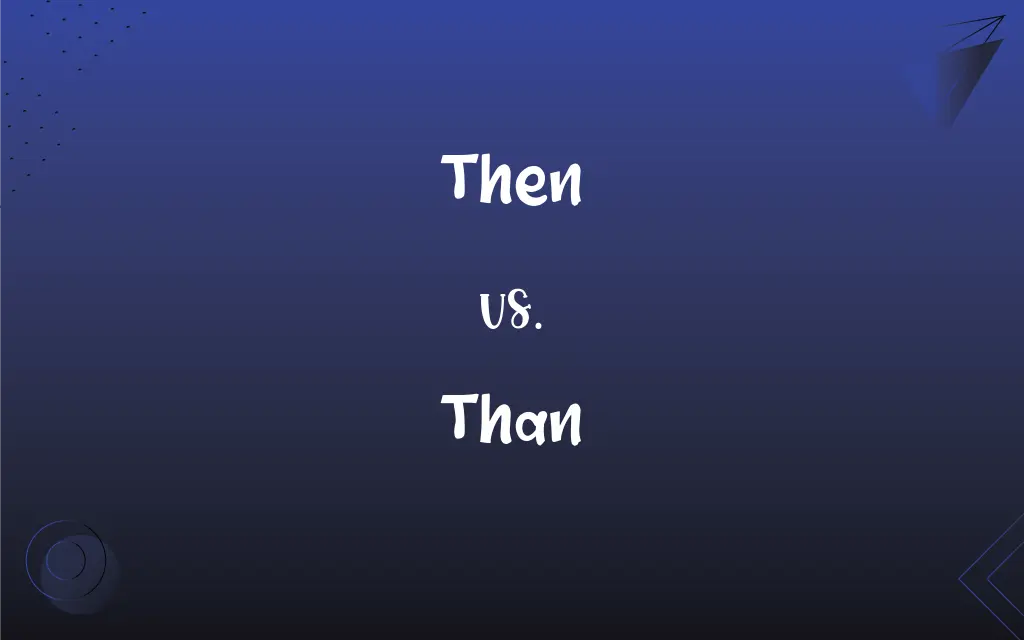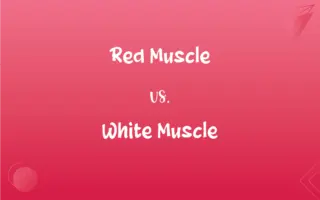Then vs. Than: What's the Difference?
Edited by Aimie Carlson || By Harlon Moss || Updated on October 26, 2023
"Then" refers to a point in time, while "than" is used for comparisons.

Key Differences
"Then" and "than" are two distinct words in the English language, both crucial, yet each with its own specific use and meaning. "Then" often relates to time, suggesting a sequence of events or a specific point in time. For instance, you might say, "First we went to the store, and then we went home." Conversely, "than" is employed in comparative statements. If one were to compare the heights of two people, they might say, "John is taller than Mike."
In terms of phonetics, "then" and "than" can sometimes sound similar, especially in rapid speech. However, context usually clears up any confusion. If someone says, "She is better then him," the intended word should likely be "than," because the sentence involves a comparison. Misusing "then" in place of "than" or vice versa can lead to misunderstandings or give the impression of a grammatical oversight.
In addition to its primary use related to time, "then" can serve other purposes. It can act as an adjective, as in "the then-president," or even as a noun, as in "the now and then." "Than," on the other hand, remains consistent in its role, aiding in comparisons and contrasting ideas or items.
Grammar purists might stress the importance of not confusing "then" and "than," but everyday language use can sometimes blur the lines. Despite this, understanding the difference and employing each word correctly can enhance clarity in communication. Whether discussing past events or comparing two entities, choosing the right word can make a significant difference.
Comparison Chart
Primary Use
Refers to time
Used for comparisons
ADVERTISEMENT
Part of Speech
Adverb, adjective, noun
Conjunction, preposition
Example Sentence
"We ate and then we left."
"She is taller than her brother."
Contextual Misuse
"Better then ever."
"I will see you than."
Phonetic Difference
Sounds like "hen"
Sounds like "van"
Then and Than Definitions
Then
Serving as an adjective referring to a specific time.
The then-governor made an appearance.
ADVERTISEMENT
Than
Used after certain adjectives to introduce a differing scenario.
It's more complex than it looks.
Then
Highlighting a contrast with a previous statement.
I thought I was right; I realize then that I was wrong.
Than
Used in comparisons.
He is older than she is.
Then
Referring to a point in time.
I was younger then.
Than
Highlighting an exception.
Everyone than him understood.
Then
Indicating a sequence of events.
First this, then that.
Than
Employed in expressing preference.
I'd rather walk than drive.
Then
Suggesting a result or consequence.
If that's the case, then what?
Than
Serving to contrast.
Other than that, it's fine.
Then
At that time
I was still in school then. Come at noon.
I'll be ready then.
Than
Used after a comparative adjective or adverb to introduce the second element or clause of an unequal comparison
She is a better athlete than I.
FAQs
Is "than" used to express preferences?
Yes, such as in "I'd rather walk than drive."
What is the primary use of "then"?
"Then" primarily refers to a point in time or sequence of events.
Is "then" always about chronological order?
Mostly, but it can also indicate consequences or results.
Are "then" and "than" interchangeable?
No, they have distinct meanings and uses.
Is "then" often related to the past?
Yes, but it can also relate to future events or sequences.
Are there phrases where "than" is commonly used?
Yes, such as "more than," "less than," and "other than."
Should I pay attention to context to determine which word to use?
Absolutely, context is key in deciding between "then" and "than."
How do I know when to use "then" vs. "than"?
Use "then" for time-related contexts and "than" for comparisons.
Can "than" be followed by a clause?
Yes, as in "He works faster than she does."
How do "then" and "than" sound phonetically?
"Then" sounds like "hen," and "than" can sound like "van."
Can misuse of "then" and "than" lead to confusion?
Yes, using one in place of the other can make sentences ambiguous.
Can "then" be used as a noun?
Yes, as in "every now and then."
Do native speakers ever confuse "then" and "than"?
Yes, even native speakers sometimes misuse them, especially in informal contexts.
When should "than" be used?
"Than" is used for comparisons and contrasting scenarios.
Can "then" serve as an adjective?
Yes, as in "the then-president."
How can I remember the difference?
Think of "then" for time and "than" for comparison.
Is "than" strictly a conjunction?
Mostly, but it can also function as a preposition in some contexts.
Can "than" be used with other conjunctions?
Yes, like "rather than" or "other than."
Are there any mnemonics to remember the difference?
One way is: "Then" is for time, and "than" is to compare.
Can "then" be used to show consequence?
Yes, like in "If you're tired, then go to sleep."
About Author
Written by
Harlon MossHarlon is a seasoned quality moderator and accomplished content writer for Difference Wiki. An alumnus of the prestigious University of California, he earned his degree in Computer Science. Leveraging his academic background, Harlon brings a meticulous and informed perspective to his work, ensuring content accuracy and excellence.
Edited by
Aimie CarlsonAimie Carlson, holding a master's degree in English literature, is a fervent English language enthusiast. She lends her writing talents to Difference Wiki, a prominent website that specializes in comparisons, offering readers insightful analyses that both captivate and inform.































































